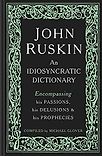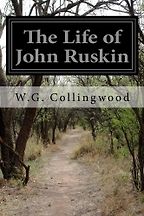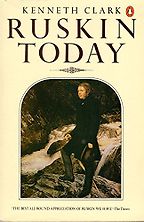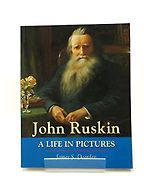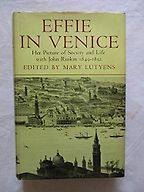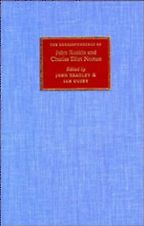John Ruskin was England’s most prominent art critic in the Victorian era. Although this sells him short. He was also a patron of the arts, an artist, a prominent social thinker and activist. Ruskin wrote numerous books, on everything from botany to political economy. Why is he still important 200 years after his birth?
To mark the bicentenary, I helped to curate a recent show at Two Temple Place in London, that marvellous Arts & Crafts building created for the Astor family on the Embankment, which ran during the spring of this year. I was asked to try and bring Ruskin alive for the 21st century by Martin Caiger-Smith, who runs the curating course at the Courtauld, and is art consultant to 2 Temple Place. The chief curator was based in Sheffield, where Ruskin created his only museum in the English regions. The idea was that the best of the Sheffield collection should be brought down to London, where there would be a general presentation of Ruskin and his ideas, so that we might all begin to be able to understand him again, to understand who he was, why he was significant, when he was significant, and why he deserves to be looked at with great seriousness now.
“Ruskin had been somehow lost in sepia, unlike other great Victorians.”
That was the task, and I was brought in because we had a general view, Martin and I, that Ruskin was somehow lost in sepia, unlike other great Victorians. Why was this the case? The fact is that Ruskin’s own works are not greatly and widely read. In fact, when I first started to look into this, I discovered it was almost impossible to find any Ruskin books in Cambridge, where I was once a student. In fact, the only book I could find there was a copy of Kenneth Clark’s anthology, Ruskin Today, in the local Oxfam shop. So bringing Ruskin alive now, that for me was the challenge of the exhibition—not only to show off the wonderment of his works and his ideas, but to try and discover who exactly the man himself had been. He was so much more than just an embodiment of his own ideas.
Why do we know so little about him in comparison in comparison with other eminent Victorians? Why do we care so little about Ruskin himself, in comparison with our care for George Eliot and Tolstoy, and other contemporaries of his? In part, it was to do with the nature of the kind of work he was writing—art criticism and social criticism—which is obviously not so fashionable, nor so engaging or so easy to read. This was the challenge, bringing Ruskin alive now.
Get the weekly Five Books newsletter
One of the ways to bring him to life was to find out who exactly he was. We felt that he had somehow been lost within what is understood to be the nature of his ideas. He had set forth his ideas clearly, even stridently. Ruskin, the man, and the way he related to the world in which he lived, was less evident. And so we brought him alive in various ways. I wrote the interpretative texts. I wrote the timeline and I also was keen to find many photographic images of Ruskin, as many as we could find for the exhibition, again in order to bring him alive as a human being. I also created two large panels of quotations called Ruskin’s Loathings. He hated iron railings, Wagner, bicycling, even the railway network—in spite of the fact that he used it a great deal. In short, he was quite an an eccentric.
This gives you terrific fodder for compiling a dictionary.
Yes, it does. One of the reasons I wanted to write the dictionary, which developed out of the exhibition really, is that I was immersed in the exhibition for many months, re-reading many of Ruskin’s books and also reading around very widely. But I was also thinking simultaneously about reviving the idea of the dictionary, which itself is a bit of a lost literary form.
I’ve always delighted in dictionaries and especially unusual dictionaries, such as those by Ambrose Bierce and Flaubert, Voltaire, Raymond Williams, all those really wayward dictionaries, which seem to be very authoritative, although in fact they’re highly personal, very unusual, and quite full of surprises. Bran tubs of surprises, in fact. Given what I was discovering about Ruskin, his multifariousness, he seemed to me a very suitable subject for a dictionary. That’s how the two came together.
Your dictionary is intriguingly subtitled ‘Passions, Delusions and Prophecies’. One thing that comes across very clearly in its pages are his many self-contradictions, but Ruskin also comes across as a more witty, amusing, curious, and eccentric fellow than perhaps some of his more ponderous writings in his books would suggest.
The probable reason for this is the fact that he has been so fiercely defended by, and interpreted by, Ruskinians, who are very serious people indeed. And to think of Ruskin as being a tissue of contradictions and in many respects a rather absurd figure is, in addition to being very important, perhaps not exactly to their taste. I even discovered that by the response to my contribution to the the exhibition-making. When the London exhibition transferred to Sheffield, it became a very different thing. The interpretation was much softer, more traditional and much and more reverential . . .
Let’s start with perhaps the most prominent Ruskinian, Collingwood, who studied under Ruskin, and ended up spending a lot of time with him, traveling around Europe and serving as his secretary until Ruskin’s death in 1900.
There have been so many biographies of Ruskin, short and long, new and old. One of the shortest—a very good one—is by James Dearden. The longest by far is a recent one by Tim Hilton, which is a two-volume affair. What I wanted for my dictionary—and for my endeavours in the exhibition—was to bring myself as close as possible to Ruskin by seeing him through the eyes of a man who knew him very well during his own lifetime—such as his secretary. This is why Collingwood was so important to me. You can feel Ruskin breathingly alive in that book. In fact, the copy of Collingwood that I bought, which dates from 1900 (the year of Ruskin’s death), even had newspaper cuttings from around that period—including an interview with Ruskin’s chief carer, Joan Severn. I felt extremely close to Collingwood as a result of that, and a very real sense of being close to Ruskin himself, and his unusual habits, and especially, for example, in Collingwood’s wonderful description of the musical evenings at Brantwood, I thought all this was absolutely wonderful.
Ruskin championed the elevating effects of making art first-hand. And he believed that just as anyone could learn mathematics, or another language, so anyone would be able to learn to draw. It was only a matter of practice, a matter of looking. That aesthetic experience is central to his entire philosophy. Like Ruskin, Collingwood was a practicing painter, which also puts him in a particularly good position to assess, evaluate, and champion Ruskin’s output, not just as a writer, but also as an artistic practitioner.
Absolutely right. I think Collingwood’s views of Ruskin, the way he champions and describes him, now more than 100 years later, create a kind of immediacy. What struck me is the way that Collingwood tries to understand and get into Ruskin’s shoes. He was so close to the anguish of dealing with all the Turner business, for example, and other tribulations. Ruskin had such a terrible time as Turner’s executor. There was such chaos in Turner’s studio. It involved seven years of hard and selfless labour. It really took its toll on his physical and mental health.
One of the things that Kenneth Clark points out in his book about Ruskin, was that he may have been seen as difficult to like in his own day for the very fact that he championed a radical artist like Turner. Contemporary audiences perhaps weren’t ready for radicalism of that sort in the arts.
What’s also fascinating is that Ruskin was championing Turner, almost in spite of Turner himself. Turner wasn’t especially excited by Ruskin battening onto him in this way, year after year. Ruskin’s father was furious that Ruskin was barely even acknowledged after Turner’s death. He left him not a farthing in his will. And still Ruskin did all this bloody hard work on his behalf. You could call it a thankless task, Ruskin’s obsessive dedication to the cause of Turner. It’s all so fascinating.
Turner was maybe a little bit freaked out being described as the angel of the apocalypse.
I’m sure he was. Anybody would be freaked out by Ruskin’s extraordinary descriptions of them. They’d be overwhelmed by them, lucky to be praised rather than dispraised perhaps—but it was tricky to be praised by Ruskin.
Clark himself is an interesting figure and in some ways similar to Ruskin. He’s become somewhat outmoded, though maybe is having a bit of a reevaluation. Like Ruskin, he was a brilliant wordsmith, which comes across clearly in his books.
Very much so. Also he was following in Ruskin’s footsteps, Ruskin was the very first Slade Professor of Fine Art at Oxford. Clark held that same position in the 20th century. Clark was passionately interested in Ruskin’s inaugural lecture as Slade Professor, and what it reveals to us about Ruskin’s passionate defence of the expansion of the British Empire. All deeply unfashionable stuff, of course. There are great parallels between the two men. As you say, Clark himself is now very much outmoded, but he was perhaps less so in 1964 when this book was first published. The interesting thing is, this book is still the authoritative anthology in my view. It was also the first anthology of Ruskin’s writings that I read, and I thought it absolutely wonderful, in so far as it showed us the extraordinary range of the man, which would be much more difficult to find and to fully appreciate if you were simply reading through Ruskin’s own works in 4o volumes…. Especially those that he wrote when he was very young. Why? Because he was at his most dreary and biblical and ponderous when he was very young and he got lighter of touch as he got older. When he was off his guard, writing letters for example, he could be a bit more light-hearted.
Here are two individuals of extraordinary erudition and prolific output, and also both great popularisers of the arts.
Ruskin was very keen to be a populariser, although strictly on his own terms of course. And Clark was a brilliant writer in his own right. What’s so exceptional about Clark is the range of his reading on Ruskin. Many more books have been published in the last 50 years, but imagine how much more difficult it would have been in 1964 to have pulled together this range of material. The way that he brought it all together and edited it into shape, is magnificent. The pieces are often very judiciously short. They’re very well chosen, edited and pinpointed.
Let’s talk about A Life in Pictures by James Dearden. I loved flipping through this book. Ruskin was depicted so many times by so many different artists, there are so many likenesses of his made in the two centuries that have elapsed since his birth. This is almost like a pictorial potted biography of Ruskin, based on those portraits.
It really is. What I find so extraordinary about it is all you learn from it, almost incidentally, from the detailed commentary, which seems to flow out so serendipitously. When I was first given a spare copy of this book in Sheffield—it had been out of print for years—I thought at first that it didn’t sound very interesting. But in fact, when I began to read it, and subsequently got in touch with James Dearden himself – he’s still very much alive, living on the Isle of Wight—I found him to be a veritable encyclopedia of Ruskiniana. Everything tumbles out of him. When I asked him whether he knew anything about Ruskin’s visits to Sheffield, he immediately said, ‘well I do know that he was in touch with Councillor Bragge in 1875′. That was immediate and quite spontaneous. James gave me a tremendous amount of help with my research into Ruskin in Sheffield in particular. My contribution to the Ruskin in Sheffield catalogue was to write an essay about Ruskin’s engagements with Sheffield, which I was delighted to do as I’m a Sheffielder myself.
A Life in Pictures is also an extraordinarily wacky biography as well. What James did through sometimes bizarre and manifold researches, was to reveal to us the nature of Ruskin’s interest in his own self-portraiture. This all is absolutely fascinating and really delightful, right down to those minute descriptions of his teeth and his fingernails. He brings everything about the man alive so well. And his clothing gets close treatment. Ruskin was very particular about his own appearance, and he would be dismayed to find himself portrayed in ways which he did not find flattering.
The book is like stepping into a period costume drama. It’s wonderful. Take for example a passage where Ruskin is in despair in old age. The photographer has just left, and Ruskin, having examined the outcome, remarks: I’m an orangutan again. I would give up half my books for a decent profile. James Dearden reveals these extraordinary, delightfully personal things about the man himself, and you wouldn’t expect to go to this book to find them. None of the books I found particularly influential are the regular places you’d think to go to find interesting and insightful information, not necessarily.
His relationship with numerous other individuals in his life was also strange. Not least of all his relationship with his wife. It was something of an arranged marriage. Tell us about the extraordinary correspondence of his wife Effie Gray, much of it written while traveling in Venice?
I picked up this book and I thought, ‘This is the last thing I want to read. I know how uninteresting this will be . . .’ Yet it was one of the most insightful books that I read. To get a view on Ruskin from the woman who was living and breathing with him twenty-four hours a day, for this relatively short period of time, was a revelation. The crass view of her, perhaps particularly among die-hard Ruskinians, is that this woman deserves to be dismissed as an air-headed socialite. In fact, this is far from the case. She was far cleverer than this. She was also a very different sort of person from Ruskin himself, which is what makes the contrast all the more interesting. Effie could be very flighty, and she did love society, dressing up, dancing, in fact all the things that Ruskin completely abhorred. But her insights into the way he behaved, worked and conducted himself and how he treated other people, make for an absolutely fascinating read.
It helps us to build a wonderful, varied portrait of Ruskin the man. He would dismiss people without a second’s hesitation. He often really had no interest in them. He would meet someone, and on the following day forget he’d ever met them. On one occasion, he is reported as making this wonderful remark: I have to turn up to dinner today, in order to prove that I’m not a myth. These are delightfully revelatory things that Effie manages to tell us about him, and incidentally, she reminds us that she’s clever enough in her own right. She describes how she’s learning German, she knows Italian, feels that her French is not up to scratch as far as she’s concerned. We’re talking about a woman who is no pushover, intellectually.
We learn an awful lot about the unguarded Ruskin by reading her letters, his weaknesses and foibles, his impulsive collecting habits, the money he would spend (often his father’s) on flights of fancy such as casts of sculpture and all sorts of other stuff, and having them shipped back to England, constantly. He was spending absurd amounts of money, and were it not for these letters of Effie’s, we might not be unaware of the extent of his compulsive behaviour. It’s an insightful commentary upon the nature of the man himself, and how he proceeded through life, pleasing himself.
She’s a very lively foil to the somber, serious and rather solitary Ruskin.
A wonderful foil, and it’s delightful to have a joke at his expense from time to time, as when she describes him returning home covered in dust like some old witch on a broomstick. There’s so much ponderous seriousness in the world of Ruskin that it’s refreshing to find a little bit of lightness, a little bit of fresh air in the archives.
Speaking of seriousness, the correspondence with Charles Eliot Norton, by turn, was in some instances very profoundly serious, to the point where his correspondent felt it necessary, as the executer of Ruskin’s estate after his death, to destroy some of the correspondences as being too revealing.
Yes, it is extremely significant. This correspondence really shocked me, because it showed us Ruskin talking to another man in a completely open-handed, open-hearted way, which was something he was incapable of doing with so many other people, even those—or perhaps especially those—who were closest to him. What fascinates me, moreover, is that he was writing so candidly to an American. With an Englishman’s reserve in the nineteenth century, such candour is almost unthinkable. What’s more, Ruskin was so condemning of America and American habits—take for example his denunciations of that poor family he travelled with to Verona, an episode which I describe in the dictionary. However he opens his heart to Norton in a way that he scarcely does to anybody else. It’s quite extraordinary to see the lengths to which he goes to expose himself, his own limitations, his own humiliations, his own anxieties about himself. Even his own lust to do things that he’s incapable of doing.
Take for example a wonderful letter where he says, ‘I want, I want, I want’ . . . His manic delivery is striking, and he’s baring his soul in a way that he scarcely does anywhere else, and certainly not in his public lectures or in his public persona. It’s an amazing insight into the man himself, the way he responds to Norton.
There’s a kind of manic energy that runs through Ruskin’s life and work, some of which is captured in these letters. So much of it in fact, that arguably the man became unhinged in later years.
I think he did become unhinged in later years. It was partly due to the fact that he seems to have had no control of his emotional life. He would sometimes respond to women as if someone had thrown a brick at him. He doesn’t know how to cope with emotions, partly because of his difficult relationship with his parents. He was a man-child all his life. He was very subservient to his parents, he would never criticise them and didn’t know how to get beyond them. They were forever interfering in his life, as Effie tells us all the time in her letters. Ruskin doesn’t really grow up, but he is also this towering intellect, perpetually questing in all directions and never able to stop, until something stops him, and he collapses. Eventually he breaks down into complete madness, as a result of a tragic affair with Rose La Touche. Her mother invited him to give her drawing lessons, when she was nine years old. That’s how it all began, his complete infatuation with the girl.
Interestingly, she didn’t welcome the way he wanted to get close to her at all when she was young. I’m very much aware of this having read around the subject, although the way it’s often been described means that you’re not necessarily aware of this. I don’t think anything terrible went on between them at all. Nevertheless, he made it clear that he wanted to marry her, and he had to contend with the appalling involvement of her mother, who was almost certainly attracted to him, too. It’s tragically bizarre, the whole arcane thing. He seems to be heading for a fall all the time. His manic nature suggests that he doesn’t really have any emotional ballast. This to me seems to be the problem.
What I find extraordinary, considering how topsy-turvy he was in his personal life, his emotional life, his mental state, is the stillness and poise that we find in so many of his drawings and paintings. They’re terrifically well observed, almost contemplative studies of nature, of simple objects—stones, architectural details. It makes for such a contrast to what must’ve been going on, on some emotional, psychological level.
It is absolutely extraordinary that there is this total difference, that he can concentrate on a stone or a tree, and analyse it with such thoroughness and somehow find a point of stillness within himself, which enables him to pour forth everything about what he’s doing at that moment. But nothing beyond it. It is truly remarkable. I suppose that’s part of what we call his genius, the fact that he can still this emotional turbulence for a moment. In fact, he does say of his writing that it was consolatory. Although we know what his nature was like, he always said in his correspondence that his writing was a steady affair. In contrast to his friend Thomas Carlyle, writing was not a tumultuous, difficult business for Ruskin. He could move through it steadily and regularly. I think the very act of writing and finding these wondrously still moments of experience, both helped to keep him together.
Let’s speak about Ruskin’s contemporary relevance from a political standpoint. He’s been championed as a kind of precursor to socialism for some of his ideas, championing the working man. Technology was a bane to him, but he also saw in it the promise of liberating the working class, something that may find resonance in contemporary debates about the threat—or potential—of artificial intelligence and robots replacing workers. There’s a lot that rings true in what we read in Ruskin’s books today.
The humanising nature of proper work is central to Ruskin’s message. This is something that he begins to write about in the 1860s, and features very prominently in Unto This Last. It was something that his father was completely repelled by. He wanted Ruskin to concentrate on art criticism, not to stray into the social or political, which he felt were dangerous subjects. And of course they did prove dangerous in that tumultuous century. Take his contemporary William Morris, who championed a return to the hand-crafted as an antidote to industrial manufacture. Morris was a socialist and Ruskin certainly wasn’t, but they share a sensibility. In spite of the fact that Ruskin was a true blue conservative in so many respects, he was very much mindful of the exploitation of capitalism.
Ruskin was coming at the idea of communism from a totally different perspective from that of Marx. He defended the idea of holding important principles in common and doing work which is not exploitative, work which does us good, in the same way that he believed art is health-giving. All these matters are utterly relevant for today.
And the aesthetic side of things is inseparable from political considerations. In a way, Ruskin couldn’t take his father’s advice to heart because he believed that these elements—art and politics—are closely intertwined.
Absolutely. His work, even on matters artistic, bleeds into the political. That’s one reason why he was at such odds with John Stuart Mill, the idea that economics is some kind of disembodied, inevitable thing. Actually, economics has to do with the way you treat human beings and the way they behave in relation to each other. That was the message.
Would you consider yourself a prominent Ruskinian now?
I’m not a Ruskinian, nor have I ever been a Ruskinian really, but I’ve always read Ruskin and cared for his writing. That attachment to his writings really deepened over the last two or three years. I first became interested in Ruskin when I was young because there had once been a museum in Sheffield, although by the time I was a young boy that museum had been dispersed. The collections themselves were for the most part in storage in Reading when I was a boy, and they did not return to Sheffield until recently. Nonetheless, there were a few items from that original collection that stayed in Sheffield, and one of these created my very first link to Ruskin—it was my very first glimpse of him, you might say—when I used to visit Sheffield’s Mappin Art Gallery during my childhood. There I saw a drawing by Ruskin of a peacock’s feather. It was something I went to see again and again, well into my teens, in order to to marvel at the way in which he seemed to have rendered a peacock feather with such a minute attention to detail. I had never seen a feather painted like that. My only hands-on experience of feathers was to do with pillow fights, and the way that feathers floated up into in the air when you hit your sister with a pillow. It never really occurred to me at that moment of combat in our bedroom that a feather might be a very particular thing, which you might admire very minutely, and which might be painted in the hues of heaven, as this peacock feather seemed to be, and which struck me as absolutely extraordinary. It was a lesson from Ruskin about close observation. Close looking, close observation, help you to see the world in a way that you had never seen it before. To appreciate small things such as stones, as you have never appreciated them before. I learned this important lesson when I was a teenager by looking at this painting of the peacock’s feather, which is still in Sheffield to this day. So that kind of makes me a Ruskinian in spite of myself, does it not? Even though I wouldn’t readily accept the label, he has made me a disciple of acute looking.
In our attention deficit times, close looking is certainly something that deserves greater prominence.
There’s no one who forces us to pay attention to everything that surrounds us more clearly than Ruskin himself.
The Ruskin Dictionary is a great primer for people looking for books to get acquainted with Ruskin’s thought. For those who are braced for it, what would be your recommendation for the first work to read by Ruskin himself, for somebody who is otherwise unacquainted with Ruskin.
There is one of Ruskin’s books that I would read before anything else—his autobiography, which is called Praeterita. He wrote it when he was in his eighties. It was really his last major project, and it was finished by his cousin and carer Joan Severn, who edited it for publication, and even censored it. This is the book I would recommend to anybody to begin with, because it’s less cluttered, less convoluted, less theoretical, less difficult to read. In fact, it’s a wonderful read, even if it is not an entirely truthful book, in so far as Ruskin is remembering his past very selectively. He’s largely remembering his childhood—his later life gets much less attention—and even that he is often misremembering, describing the nature of his aloneness in ways which are not entirely true, because he was not completely alone. He likes to pretend that he was, in order perhaps to concentrate on his own uniqueness.
It is a wonderful, lyrical book and it is composed of single, long paragraphs, which are delightful, like prolonged exercises in lyricism. The very last section of it is like something out of Ezra Pound’s Cantos, a complete delight to read. It can be read spasmodically, so you don’t feel you have to be limbering up every morning to read another 50 pages of Ruskin. You can read it quite casually, bit by bit, and it’s an absolute delight, end to end.
Interview by Romas Viesulas
December 19, 2019. Updated: December 23, 2019
Five Books aims to keep its book recommendations and interviews up to date. If you are the interviewee and would like to update your choice of books (or even just what you say about them) please email us at [email protected]
Five Books interviews are expensive to produce. If you've enjoyed this interview, please support us by donating a small amount.

